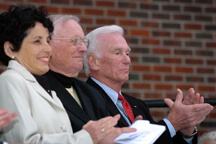
| RELATED INFO |
| * Purdue University Libraries |

January 16, 2009
Eugene Cernan, most recent to walk on moon, donating papers to Purdue
WEST LAFAYETTE, Ind. - |
Cernan, a 1956 Purdue graduate, is donating his personal papers to the university's flight archives, Purdue President France A. Córdova announced Friday (Jan 16). Córdova made the announcement in Houston in an appearance with Cernan. Houston is home to Cernan and to NASA's center for U.S. space flight.
"Eugene Cernan set an example of singular achievement for students at Purdue," said Córdova, an astrophysicist and the first woman to serve as NASA's chief scientist. "His legacy is for the world and the ages. We're honored that he has chosen to donate his collections to Purdue and that he continues to remember his alma mater."
Cernan's papers will join a growing list of historically significant collections in Purdue Libraries' flight archives. Armstrong, a 1955 Purdue graduate and the first person to walk on the moon, donated personal papers in November. The George Palmer Putnam Collection of Amelia Earhart Papers, the world's largest compilation of papers, memorabilia and artifacts related to the late aviator, also reside there.
Earhart, the first woman pilot to cross the Atlantic Ocean, set world aviation records and worked as a Purdue staff member in the mid-1930s. She disappeared July 2, 1937, over the Pacific Ocean as she attempted to fly around the world.
Purdue Libraries' Archives and Special Collections also houses the papers of Ralph Johnson, a 1930 Purdue graduate in mechanical engineering and a flight pioneer who was the first person to document aircraft landing procedures that are still used today.
"I am extremely proud and honored to be included in the archives of Purdue University with so many people who have contributed so much to our nation," Cernan said.
James L. Mullins, dean of Purdue Libraries, said Cernan's papers are a much sought-after addition to the flight archives.
"Our expanding flight archives now include some of the key individuals and events in flight history," Mullins said. "These archives also show Purdue's significance in the advancement of flight. We have had 22 Purdue graduates who have gone on to be astronauts, and we want to build our flight archives to reflect the university's rich history and contribution to air travel and space flight."
A Chicago native, Cernan graduated from Purdue in 1956 with a bachelor's degree in electrical engineering and was commissioned through the university's ROTC program. He entered flight school after graduating, and in 1963 received a master's degree in aeronautical engineering from the U.S. Naval Postgraduate School.
Cernan was one of 14 astronauts selected by NASA in 1963. He carried out three space flights. As a pilot aboard Gemini IX in 1966, he became the second person to walk in space. He was a lunar module pilot for the Apollo X mission in 1969.
As commander of Apollo XVII in 1972, he became the most recent person to walk on the moon's surface.
Cernan participated in the design, engineering and development testing of spacecraft hardware and systems for NASA. He was a member of NASA's senior management team and reviewed decisions that directly affected operations in mission planning.
From 1973-75, he served as a senior U.S. negotiator during discussions with the Soviet Union concerning the joint Apollo/Soyuz project between the two superpowers. After retiring from the Navy in 1976, he joined Coral Petroleum Inc. as executive vice president of the international division. In 1981 he started his own business, the Cernan Corp., to pursue management and consultant interests in energy, aerospace and other industries. He also has been actively involved as co-anchor on ABC-TV's presentations of shuttle flights and on ESPN's documentary coverage of "Earthwinds Hilton." He recently wrote his autobiography "The Last Man on the Moon."
Purdue named Cernan a distinguished engineering alumnus in 1967. He holds honorary doctorates from Purdue and three other institutions, along with numerous honors, including the Navy Distinguished Flying Cross, the Distinguished Service Medal with Star and the NASA Distinguished Service Medal. He has been inducted into the U.S. Space Hall of Fame, the National Aviation Hall of Fame, Naval Aviation's Hall of Honor and the International Aerospace Hall of Fame.
To date, 22 Purdue alumni have been chosen for space flight. Purdue is known as the "cradle of astronauts," and its alumni have flown on more than one-third of all manned U.S. flights.
Córdova announced Cernan's donation on the second of a six-stop tour visiting Purdue alumni in regions across the United States. The tour began Thursday (Jan. 15) in Dallas and is scheduled to end March 18 in Boston. Other planned stops include Atlanta (Jan. 30), Naples, Fla. (Feb. 14-16), and San Francisco (Feb. 24).
Purdue Libraries' Archives and Special Collections moved this week into the state-of-the-art Virginia Kelly Karnes Archives and Special Collections Research Center on the fourth floor of Stewart Center.
Writer: Jim Bush, (765) 494-2077, jsbush@purdue.edu
Source: James L. Mullins, (765) 494-2900, jmullins@purdue.edu
Purdue News Service: (765) 494-2096; purduenews@purdue.edu
FILE PHOTO CAPTION:
Eugene A. Cernan, far right, applauds with Purdue President France A. Córdova and Neil Armstrong during a ceremony on campus. The two astronauts and Purdue alumni have donated papers to the university. (Purdue file photo/Dave Umberger)
To the News Service home page
